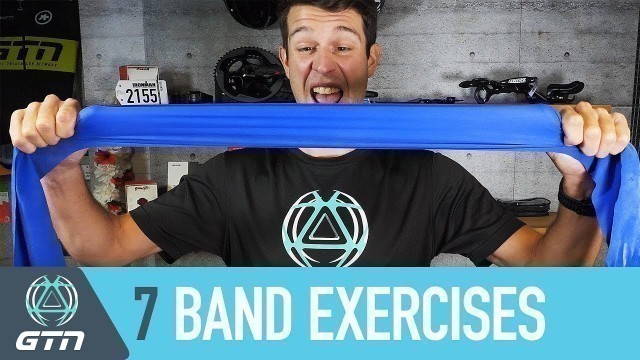'7 Resistance Band Exercises | Strength and Conditioning For Triathlon'
Posted Sep 30, 2021


'Strength training isn\'t just about throwing big weights around. It\'s also important to work on those finer movements that activate muscles, and give you control and stability around your joints. Which is where this thing comes in. The theraband, or resistance band. Now it may not look like much, but it does a heck of a lot. And the nice thing with it is, it\'s cheap, and it\'s easy to take anywhere you like. Now, you may have seen these before in a variety of different colours. And that\'s not for looks. It\'s actually for varying resistance. So here are a few useful exercises that you can do with a theraband for triathlon. Okay, let\'s start with some shoulder exercises. These will help to prevent that dreaded swimmer\'s shoulder, as well as improve the catch and pull phase of your stroke. Simply loop the theraband around the door handle or rail, as I am. Stand back to put some tension in the band. And now you can perform some exercises. First up, we have the rotator cuff exercise. Stand tall with your shoulders set back to a neutral position. Holding the theraband, bring your elbow directly out to the side, and in line with your shoulder. Start with your forearm parallel to the ground, then rotate your forearm as far as you can to vertical. Make sure it\'s a slow and controlled movement. Then, rotate your arm back down to the starting position. A good starting point is two or three sets of 10 repetitions on each arm. Moving on, now for a similar exercise. The external shoulder rotation. Stand side-on with your elbow tight to your side at a 90 degree angle. Again, we\'re going to make controlled movement out to the side, as far as you can, without losing form. Perform 10 reps, then switch arms, and repeat through two to three times. Next up, we\'re gonna switch things around, and do the internal shoulder rotation. It\'s the same controlled movement, but this time inwards. Gonna start with our hand facing outwards, and we\'re gonna rotate inwards as far as we can, in a controlled movement. Again, perform 10 reps, then switch your arm, and repeat through two to three times. The clam exercise focuses on your glute muscles, which actually tend to be the cause of a lot of lower limb injuries. The issue is, when the glutes are too weak, or simply don\'t activate. Which is hardly a surprise considering most of us spend a whole day at work, sat at a desk, very rarely using our glutes. To do a clam, you need to lie on your side, knees bent, and soles of your feet in line with your spine. Make sure your hips are level, and not tilted too far forward or backwards. Now, perform a clam by lifting your upper knee by using the glute muscle. Lift the knee as high as you can with control, whilst holding your form. Now for the lateral walk, which is also called the monster walk, and you\'ll see why. Loop the band just above your knees, or just above your ankles. Keep your back straight, but put a slight bend in your knees. Now start to step laterally, always keeping tension through the band. And then repeat back the opposite direction. Subscribe to GTN: http://gtn.io/SubscribetoGTN Check out the GTN Shop: http://gtn.io/49 If you\'d like to contribute captions and video info in your language, here\'s the link
Tags: Ironman , strength and conditioning , iron man , Triathlon , tri , GTN , Global Triathlon Network , swimbikerun , triathlon training , triathlon skills , tri bike , triathlete , Ս , injury prevention , Չ , traithlon , resistance band , body conditioning , theraband , Ջ , mark threlfall , triathlon tips , Ᏸ , body maintenance , Վ , S&C , Ꮹ , Ꮿ , gtn maintenance , triathlon maintenance , triathlon injury , Ꮬ , 3059
See also: kai cenat , spor , Christian , functional , fitgirls , arm workout , motivasyon , thatwasepic , fat , best exercise for
comments- '15 Min FAT BURNER| No Gym/Equipment'
- 'GyManiac di FIBO2016 #2 | Ketemu Marc Fitt, Lex Griffin, Ross Dickerson & LEG DAY!'
- 'Next Level Of Fitness | Michael Vazquez | Fitness Devil'
- 'Fitness e dintorni 4 parte: Wii e xbox kinect'
- 'Deep Glute Stretch'
- 'FITNESS SF - Cardio Combat w/Paul Hoyos'
- 'Bank Outdoor-Workout am Kreuzbergsee mit fitbody Personal Trainer & Online-Coach: Steffen'
- 'John Cena: Bench Press Is Most Worthless Test Of Skill At NFL Combine | SI NOW | Sports Illustrated'
- 'BUNGEE FITNESS LUCASPORT'
- 'Fil-Am CrossFit athlete, wagi sa Dubai Fitness Championship 2022'
- 'Rob Glick - Glutes Workout with the Total Gym FIT'
- '☕️ The Fatty Joe Show: Episode 18 - Corey Modrowski: KetoRucker - Fitness & Adventure #keto #lowcarb'
- 'How to IMPROVE YOUR HEALTH and FITNESS, How to IMPROVE PERFORMANCE | Things I LEARNED From PAUL CHEK'
- 'I Like It by Cardi B, Bad Bunny & J Balvin'
- '24/7 Fitness Warriors Sam VS Rob'
- 'Kolejna zajawka BUNGEE FITNESS POLSKA!'
- 'ASKING ENGLISH GIRLS IF...'